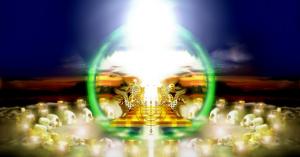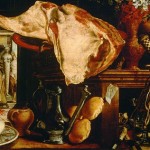 Acts 7:55-60
Acts 7:55-60
Those of you who are following the Prayer Book lectionary will recognize that I have taken this morning’s lesson from the Epistle Lesson appointed for St. Stephen’s Day, and not from the daily lectionary. We are entering a brief but intense period in the lectionary when there are many special commemorations and therefore special lessons.
At first glance, the life and death of St. Stephen may seem intended to produce a case of theological whiplash. We have just prepared ourselves for and finally participated in the joys of Christmas, and then we hear of the tragic death of Stephen.
Why?
I think celebrating St. Stephen’s Day right after Christmas makes a lot of sense. The point is that the things Jesus Christ came to earth to do are supposed to be continued by His Church. St. Stephen was a faithful disciple of Jesus Christ, an example for all Christians, for he followed His master in all things.
Just as the Holy Spirit entered into Mary so that Jesus Christ was born to save the world, so also the Holy Spirit enters into the Body of Christ so that the Church may continue Jesus’ work of salvation. And St. Stephen is the first fruits of Christian martyrdom for the glory of God and the good of the world.
The beginning of the book of Acts is very instructive for understanding what God wishes us to understand by the heroics of the early church: “In my former account I made, O Theophilus, of all that Jesus began both to do and teach . . . .” By implication, if the St. Luke’s Gospel is intended to record all that Jesus began to do and to teach, then the book of Acts is intended to record what Jesus Christ continues to do through His Church. The most important person in the book of Acts is neither St. Peter nor St. Paul but the Holy Spirit, through whom Jesus Christ continues to act in the world.
So how does St. Stephen continue the ministry of Jesus Christ, for which He was born?
First, we hear that Stephen was a man full of faith and power who did great wonders and signs (Acts 6:8). In a similar way, Jesus is said to be full of grace and truth (John 1:14), though it could equally be said that He was full of faith and power. Stephen’s power to perform signs and wonders comes from Jesus’ own power, demonstrated all throughout the Gospels.
Almost all of chapter 7 is taken up with Stephen faithfully proclaiming the Good News of Jesus Christ, just as Jesus Himself did. And like Jesus, the truth of the Gospel incited the Jews to murder. As when Jesus was baptized, the heavens were opened to Stephen, and Stephen was privileged to see the glory of God and Jesus standing at the right hand of God.
Most striking are the similarities between the way Stephen and Jesus died. The end result of faithfully seeing and proclaiming God was the same for Stephen as for Jesus: death at the hand of the Jews. Both were brought before the council and accused of blasphemy, and both had false witnesses brought to testify against them (Acts 6:11-13.) Both were cast out of the city of Jerusalem where they were put to death for their proclamation of the Good News (Acts 7:58.)
Even as he was being stoned, Stephen called on God and cried, “Lord Jesus, receive my spirit.” His cry was the same as Jesus’ on the Cross”: “Into Your hands I commit my spirit.” At the very point of death, Stephen’s love and mercy came straight from Jesus on the Cross. His “Lord, do not charge them with this sin” could only have been said by the power of the one who first said, “Father, forgive them, for they know not what they do.”
St. Stephen is such a shining example of a Christian disciple that it is easy to see His Master through him. But the point of celebrating St. Stephen’s Day is not just to honor a faithful brother in Christ but to give glory to Jesus Christ Himself who was born and lived and died that men, like Stephen and us, may be made like Him in all things.
We celebrate St. Stephen’s Day because Jesus Christ is this very day raising up more St. Stephens to faithfully proclaim Jesus Christ. The same Jesus Christ that St. Stephen served and saw standing at the right hand of God is the same Jesus Christ we serve and who is still standing at the right hand of God in heaven. The same Holy Spirit that filled St. Stephen is with us, for this is the meaning of Immanuel, “God with us.”
What does St. Stephen have to do with Christmas?
Everything!
The Holy Spirit that entered Mary and that descended on Jesus Christ at His baptism and filled St. Stephen is the Holy Spirit that dwells in you. From St. Stephen to St. Paul to countless others, for generation after generation, God has called His disciples to faithfully follow Him.
Who will dare to be a St. Stephen in our generation?
Prayer: Grant, O Lord, that, in all our sufferings here upon earth for the testimony of Your truth, we may steadfastly look up to heaven, and by faith behold the glory that shall be revealed. Being filled with the Holy Spirit, may we learn to love and bless our persecutors by the example of the first martyr St. Stephen, who prayed for his murderers to You. Grant that we may, through the Holy Spirit, be made Your faithful disciples and filled with faith and power, O blessed Jesus, who stands on the right hand of God to help all those who suffer for You, our only Mediator and Advocate. Amen.
Points for Meditation:
- Meditate on the fact that Jesus Christ continues His ministry through His Church. What response does this provoke from you? What implications does this have for your life?
- What keeps you from being more like St. Stephen? In what ways has God already worked through You to teach and to do His will? In what ways may you have been resisting His call?
Resolution: I resolve to consider how God is calling me to more faithfully follow Him this year.
© 2014 Fr. Charles Erlandson















